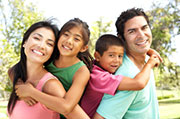- The Long-Term Effects of Daily Turmeric Supplements on Liver Health
- Could Your Grocery Store Meat Be Causing Recurring UTIs?
- Are You Making This Expensive Thermostat Error This Winter?
- Recognizing the Signs of Hypothyroidism
- 10 Strategies to Overcome Insomnia
- Could Artificial Sweeteners Be Aging the Brain Faster?
- Techniques for Soothing Your Nervous System
- Does the Water in Your House Smell Funny? Here’s Why
- Can a Daily Dose of Apple Cider Vinegar Actually Aid Weight Loss?
- 6 Health Beverages That Can Actually Spike Your Blood Sugar
Early Exposure to English May Help Spanish-Speaking Kids in School


Early exposure to English helps Spanish-speaking children in the United States do better in school, a new study shows.
“It is important to study ways to increase Spanish-speaking children’s English vocabulary while in early childhood before literacy gaps between them and English-only speaking children widen and the Spanish-speaking children fall behind,” study author Francisco Palermo, an assistant professor in the University of Missouri College of Human Environmental Sciences, said in a university news release.
“Identifying the best ways to support Spanish-speaking children’s learning of English at home and at preschool can diminish language barriers in the classroom early and can help start these students on the pathway to academic success,” he added.
The study included more than 100 preschoolers who primarily spoke Spanish. The children were learning English. The researchers found that the youngsters’ English vocabulary skills were better if they were exposed to English both at home and in the classroom.
When parents used English at home, it helped the kids learn and express new English words. Using English with classmates also helped the children practice new English words, according to the researchers.
“It is important for parents with limited English proficiency to continue speaking their native languages with children and to look for situations where they, other relatives, neighbors and children’s playmates can expose children to English so that they can have some familiarity with English before entering preschool,” Palermo suggested.
The amount of English used by teachers didn’t have a significant effect on the preschoolers’ English vocabularies. The quality and variety of teachers’ English may be more important than the amount of English they use, according to Palermo.
“Preschool is an ideal setting to study how [Spanish-speaking] children learn language because learning in preschool occurs mainly through social interactions, and languages are learned naturally by engaging in social interactions,” Palermo explained.
“Teachers should support children’s native languages and encourage activities in the classroom that allow children to interact using English,” he added.
The study was published recently in the journal Applied Psycholinguistics.
By 2030, as many as four in 10 students in the United States will be learning English as a second language, according to the Center for Research on Education, Diversity and Excellence.
More information
The U.S. Centers for Disease Control and Prevention has more about building languages.
Source: HealthDay
Copyright © 2026 HealthDay. All rights reserved.










